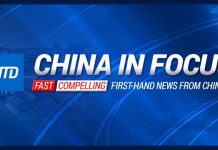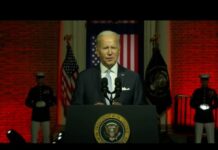Summary
The Heritage Foundation’s “Winning the New Cold War” describes the ends, ways, and means to secure America’s future while confronting the greatest external threat the U.S. has faced since the collapse of the Soviet Union—the Chinese Communist Party (CCP). To be successful, this plan requires real and sustained U.S. economic growth, greater political will, stronger external partnerships, synchronized economic and security policies, resilient supply chains and borders, adequate military deterrence, and American energy independence. It also requires buy-in from the whole of American society. In order to implement a whole-of-nation strategy, the U.S. government must educate the American public and business community, from Main Street to Wall Street, about the scope of the threat from the CCP.
Key Takeaways
The People’s Republic of China is an adversary of the United States, and the two countries are embroiled in a New Cold War.
The U.S.’s decades-long engagement strategy toward China, an even more capable adversary than the USSR, has left the American people and economy vulnerable.
Protecting the U.S. homeland and prosperity and diminishing China’s ability to harm the U.S. will require a whole-of-government and whole-of-society approach.
Executive Summary
Winning the New Cold War: A Plan for Countering China
The Heritage Foundation’s “Winning the New Cold War: A Plan for Countering China” offers the U.S. government, business community, and civil society a comprehensive policy agenda for securing a prosperous American future while confronting the greatest external threat the U.S. has faced since the collapse of the USSR.
This plan deliberately invokes the legacy of the Cold War. While U.S. officials have been reluctant to frame the rivalry with China in these terms, their apprehension ignores a simple reality: China adopted a Cold War strategy against the U.S. long ago. “It does us little good to repeat again and again that we aren’t seeking a new Cold War when the CCP [Chinese Communist Party] has been stealthily waging one against us for years,” former Deputy National Security Advisor Matt Pottinger testified before the newly established House Select Committee on Strategic Competition between the United States and the Chinese Communist Party in 2023.
To win the New Cold War, this plan calls for sustained U.S. economic growth, greater political will, stronger external partnerships, secure borders, synchronized economic and security policies, resilient supply chains, enhanced military deterrence, and U.S. energy independence. It articulates the steps necessary to protect the homeland, protect U.S. prosperity, diminish China’s capacity to harm the U.S. and hold it accountable, reorient America’s defense posture, and exercise global leadership.
Finally, this plan simultaneously exposes the Chinese Communist Party’s aggressive tactics against the U.S. and represents a call-to-arms for all segments of U.S. society, including state and local governments, the private sector, the American people, and U.S. allies and partners abroad.
“Winning the New Cold War: A Plan for Countering China” is divided into three sections.
Part I describes the rationale for the plan, examining the current state of the New Cold War between China and the U.S., weighing respective strengths and weaknesses. Recent trends driving the CCP to act with more aggression abroad and more repression at home are likely to continue, particularly after Xi Jinping secured a third term as the head of the Communist Party in 2022, consolidating power and sidelining what remains of opposing factions.
Part II, the heart of the plan, exposes the People’s Republic of China’s (PRC’s) aggressive tactics against America and proposes U.S. policy responses across dozens of fronts: from banning CCP lobbyists to arming Taiwan, from enhancing nuclear deterrence to expanding export controls, from addressing China’s role in the fentanyl crisis to shutting down illegal CCP police operations in the U.S.
Part III summarizes key action items from Part II and offers guidance for implementation by the U.S. government. Contending with an adversary as capable as the CCP will require close coordination between the executive and legislative branches, federal agencies and law enforcement, state and local governments, U.S. allies and partners, and the private sector. Above all, proper implementation of the plan will require leadership from the White House and a National Security Council capable of effectively operationalizing the President’s vision.
Summary of Key Recommendations
To protect the U.S. homeland, the U.S. must:
Stop Malign CCP Activities in Higher Education. The executive branch should ban, at a federal level, all Confucius Institutes, as they are sponsored by the CCP, and all collaborations between U.S. institutions and Chinese entities affiliated with China’s Ministry of State Security or other security and intelligence agencies. The U.S. State Department, which conducts background investigations of student visa applicants, should deny citizens of the PRC, and those of other U.S. adversarial countries, access to Department of Defense–funded research programs.
Crack Down on Illegal Chinese Police Operations in the U.S. The Department of Justice should reinstate the China Initiative and immediately shut down illegal CCP police operations in the U.S. It should ensure that these operations, which predominantly victimize Chinese Americans and Chinese nationals living in America, are a focus of a revitalized China Initiative.
Ban Dangerous Chinese Apps. Under the authority of the powers given to the Committee on Foreign Investment in the United States (CFIUS) through the Foreign Investment Risk Review Modernization Act of 2018, Congress should direct CFIUS to continuously review the activities of all Chinese mobile app companies and recommend specific apps to be banned on national security grounds. TikTok should be immediately banned in the United States.
Engage State and Local Governments. State governments must prevent Chinese companies from obtaining contracts to build critical infrastructure, resist purchasing Chinese products and technology that can pose espionage or national security risks, limit and roll back nefarious PRC activities on U.S. university campuses, encourage public funds—particularly pension funds—to divest from problematic Chinese entities, prevent the purchase of sensitive land or property near critical infrastructure or strategic farmland by PRC agents, and identify and halt lobbying of state and local governments by Chinese agents.
Prevent Malicious Land Use. Congress should require that the U.S. Department of Agriculture be included in the CFIUS process for reviewing land purchases by adversarial countries. The Department of Homeland Security should define and locate critical infrastructure that could be affected by proximity-based purchases of land near military installations and facilities of concern.
Ban CCP Lobbyists. Congress should ban lobbying by agents of the Chinese government, passing legislation that requires lobbyists representing Chinese government-controlled companies to register as foreign agents. Congress should also pass a law that prohibits foreign agents from lobbying representatives or agents of U.S. national or sub-national government entities on behalf of these companies or the Chinese government.
Ensure Border Security and Immigration Enforcement. To curb the flow of Chinese-origin fentanyl into the U.S. and secure America’s sovereign borders, Congress must fully fund thorough border and immigration enforcement and close loopholes in the system that have long been exploited by cartels and illegal traffickers.
Address China’s Role in the U.S. Drug Crisis. The U.S. should sanction individuals and entities in China, Mexico, and the U.S. that are involved in enabling the trafficking of fentanyl and other synthetic opioids and rigorously enforce the sanctions regime.
Ban the Import and Sale of Chinese Manufactured Drones. Congressshould reinsert language preventing federal government acquisition of Chinese drones in the next National Defense Authorization Act and sign it into law. In anticipation of a legislative solution, the White House should implement a ban on the federal purchase and use of Chinese drones through executive order.
Protect the U.S. from Life Science and Biotechnology Threats. Congress should appoint a blue-ribbon commission of security-cleared, non-governmental experts to assess the military-related life sciences and biotechnology threats emanating from China. The CIA’s recent creation of the China Mission Center and Transnational and Technology Mission Center should address biotechnology threats as part of a broader focus on addressing dual-use life science threats.
To protect and advance U.S. prosperity, the U.S. should:
Strengthen the U.S. Economy. The executive branch must reverse the current explosion in business regulations, particularly mandates for environment and energy, as well as labor, environmental, social, and governance(ESG), and equity policies, and Congress must return to producing annual budgets aimed at systemic reductions in debt and deficit spending.
Ensure Reliable Semiconductor Supply Chains. Congress must eliminate security loopholes and add additional oversight mechanisms in the funding and execution of the Creating Helpful Incentives to Produce Semiconductors (CHIPS) and Science Act. Congress should further improve the tax environment for capital investments for semiconductors where current recovery periods heavily disadvantage the construction of commercial infrastructure, such as chip fabricators.
Secure Critical Mineral Supplies. To expand the mining of vital rare-earth elements in the U.S., the government must reform outdated federal and state environmental statutes, including the National Environmental Policy Act, the Clean Water Act, and the Clean Air Act, eliminating redundant state regulatory barriers while maintaining commonsense environmental standards.
Risk-Manage Inbound Investment. Congress must add regulation of private equity and venture capital financing for designated “countries of concern”and sensitive transactions as defined in the 2018 CFIUS reform. New legislation should define critical sectors, and CFIUS should review acquisitions by countries of concern to ensure that they do not compromise supply-chain integrity in these sectors. This legislation should expand CFIUS review to cover PRC greenfield investments and ensure that Congress’s intent to require CFIUS review for emerging and foundational technologies is implemented.
Protect Intellectual Property. Regulators must better define the term “sensitive data” to include “personally identifiable information” and “geolocation data,” limiting the commercial transfer of such data to Chinese entities. Congress should direct the Federal Communications Commission to review and reject approvals for the export of advanced technology equipment to Chinese state-linked entities more aggressively. To address future threats, the U.S. government should expedite post-quantum cryptography plans, beginning with rapidly identifying public-key cryptography and how it is used within government agencies.
Promote “Reshoring,” “Nearshoring,” and “Friendshoring.” For critical industries vital to U.S. national security and economic well-being, the U.S. government should encourage and incentivize firms to divest from China and must be prepared to employ punitive policy measures to enforce compliance in the most sensitive industries, including sanctions and entity-list restrictions.
Reject Damaging Environmental, Social, and Governance Policies. Congress should establish legal mandates that prevent state and federal agencies from imposing regulatory requirements that make critical infrastructure or a company’s supply chain more dependent on China. Proactive measures can be undertaken through educational briefings and partnerships with state Attorneys General, Treasurers, Governors, and state and federal legislators to inform them of the ways in which China manipulates ESG to its advantage.
Address Energy and Climate Challenges. America is well endowed with natural resources and should reject plans to transition to “green energy” technologies dominated by China. The U.S. should continuously highlight China’s abhorrent use of forced labor in the energy-technology sector, ensure that U.S. firms importing Chinese green technologies comply with the Uyghur Forced Labor Prevention Act of 2021, and find innovative ways to highlight China’s poor environmental stewardship.
Promote Good Corporate Governance. Corporate boards should consider the following steps: diversifying critical supply chains by beginning to move production out of China, diversifying export markets to reduce CCP leverage over their decision-making, refusing deals that involve exposing or transferring advanced U.S. technology or trade secrets to any CCP-linked entity, rejecting ESG and diversity, equity, and inclusion (DEI) compliance measures that undermine U.S. competitiveness and advantage Chinese competitors, and applying due diligence to prospective employees and counterparties that may have connections to the CCP.
To reorient America’s defense posture, the U.S. must:
Recalibrate America’s Defense Posture to Meet the China Threat. A Naval Act of 2023 should authorize and appropriate the funds necessary for a large block purchase of naval assets for a total of $152.3 billion before anticipated savings. Ships covered by this purchase should only be those with approved, stable designs and that are in production today at numbers already stipulated in the current Future Years Defense Program that runs through 2027.
Restore Conventional Deterrence in the Indo–Pacific. The United States should immediately adopt and resource a strategy of deterrence by denial against the People’s Liberation Army. The Administration and Congress should prioritize providing the U.S. Indo–Pacific Command with the funding and capabilities identified as requirements in the Commander’s annual independent assessment under the Pacific Deterrence Initiative. The U.S. government must make determined efforts to develop and regionally deploy ballistic and cruise missiles formerly prohibited by the Intermediate-Range Nuclear Forces (INF) Treaty.
Enhance Nuclear Deterrence. The U.S. should increase the size of its nuclear arsenal by more quickly utilizing its capacity to transfer additional warheads to deployed forces in crisis scenarios and by planning to procure more modernized nuclear systems. The U.S. needs to develop additional capabilities tailored specifically to deter China, investing in the development of a nuclear sea-launched cruise missile (SLCM-N) and accelerating timelines for developing new warheads and increasing production of plutonium pits for storing nuclear warheads.
Urgently Increase Munitions Production and Arm Taiwan. When the Administration sends capabilities that are backlogged for Taiwan to other places, it should be required to justify the decision to Congress with full transparency about the trade-offs to deterrence in the Taiwan Strait. It should use the drawdown authority in the Taiwan Enhanced Resilience Act to arm Taiwan with critical munitions to fill the gap until delayed platforms are delivered.
Foster Innovation in the U.S. Maritime and Shipping Sectors. Congress should repeal and replace the antiquated Jones Act with a naval act that makes American shipping globally competitive. Any revolution in shipping must consider redesigning twenty-foot-equivalent-unit (TEU) containers, allowing new, more competitive means of managing, packaging, and shipping goods.
Align National Security Spending with National Security Priorities. Congress should require the Administration to double the share of foreign assistance spending in the Indo–Pacific within two years, bringing the Indo–Pacific to approximately 15 percent of annual foreign assistance. Congress should consider establishing an Indo–Pacific companion to the Assistance for Europe, Eurasia, and Central Asia account with a dedicated line item in appropriations legislation.
To diminish the CCP’s influence and hold it accountable, the U.S. must:
Expand Export Controls. The Bureau of Industry and Security should provide written justifications and public testimony to relevant congressional committees on previous and future rulings on granted licenses for exports to China since 2018. After a review, Congress should decide if transferring export-control authority elsewhere is warranted. Congress should also authorize at least one national security agency in the export-control license decision-making process to veto license approvals to malign PRC entities.
Restrict Outbound Investment into China. The U.S. government should insist on greater disclosure by American funders of significant investments in China. For large-scale investments in critical economic sectors, the U.S. government should require American entities investing in China to submit information on their counterparties and anticipated use of funds for approval prior to investing, under a presumption of denial. This includes joint ventures with PRC entities.
Counter Xi’s Big Data Ambitions. In the immediate term, the Department of Commerce must begin robust implementation of executive orders relating to the Information and Communications Technology and Services (ICTS) supply chain, including by publishing and enforcing final ICTS supply-chain regulations. Congress should enact a personal data privacy law to protect Americans’ privacy, reform sanctions laws to ensure that relevant data flows can be blocked under the International Emergency Economic Powers Act, and legislate extended export controls over commercial transfers of data which threaten national security.
Address China’s Abuse of the World Trade Organization (WTO). The U.S. government should make the case that China has violated the 1999 Agreement on Market Access between the PRC and the U.S., as well as its WTO accession commitments, including its commitment not to condition approval of foreign investments on “the transfer of technology.” The Office of the U.S. Trade Representative (USTR) should conduct a comprehensive review of China’s compliance with its WTO commitments, as recommended by the U.S.–China Economic and Security Review Commission. If the USTR assesses China to be noncompliant, Congress should consider legislation to revoke permanent normal trade relations (PNTR) status.
Make Limited Use of Tariffs and Non-Tariff Barriers. The U.S. government should be less risk-averse in selectively implementing and enforcing tariffs to punish Chinese predatory behaviors and facilitate reshoring, nearshoring, and friendshoring.
Hold China Accountable for Its Role in the COVID-19 Pandemic. The U.S. should continue to investigate the origins of COVID-19 and advocate a truly independent, international investigation both to advance the principle of accountability and to better prepare for the future. Until a transparent and thorough investigation is conducted with full Chinese cooperation, the U.S. should suspend funding and cooperation with Chinese laboratories on biomedical research.
Expose CCP Influence Over U.S. Cultural Institutions. Congress should organize public hearings to shine a transparent light on the ways in which the CCP coerces U.S. firms operating in China to avoid falling afoul of the CCP’s policies and priorities. Congress should exercise its subpoena powers to force senior executives of U.S. firms and cultural enterprises to explain to the American public the ways in which they have been coerced to meet censorship demands and questioned on cases in which they engaged in blatant self-censorship.
Combat Malicious CPP Activity in International Organizations. The U.S. government should conduct a detailed assessment of China’s expanding reach in international organizations and the tactics it deploys to exert influence and advance its preferred candidates to leadership positions, sharing its findings and coordinating with partners to counter those efforts. The U.S. should advocate Taiwan’s participation in an array of appropriate international organizations.
Highlight the CCP’s Abhorrent Human Rights Record. The U.S. should highlight the CCP’s lamentable human rights record at every opportunity and offer safe haven by issuing “Priority 2” refugee status to limited numbers of persecuted Uyghurs and Hong Kongers. The U.S. should also enforce the Uyghur Forced Labor Prevention Act and identify additional means at its disposal to shift the CCP’s risk calculus and alter its willingness to continue its human rights violations.
Address the Persecution of Christians. The U.S. government should look for ways to support organizations and initiatives that advocate for Christians and religious liberty in China, such as ChinaAid. Further, the U.S. should apply Global Magnitsky sanctions and other applicable sanctions to Chinese officials involved in the torture, sexual abuse, or death of prisoners who are in state custody because of their religion.
Revitalize the Blue Dot Network. The U.S. should disaggregate the Blue Dot Network (BDN) from the Biden Administration’s Build Back Better World and focus on promoting better standards, greater transparency, and a new vision for regional connectivity. The U.S. should also align aid and economic engagement agencies in execution of the BDN and support Organization for Economic Co-operation and Development proposals for BDN certification.
Address Illegal Fishing and Maritime Militia Activities. The U.S. must draft a clear declaratory policy against China’s illegal fishing practices, directly attributing the fleet’s actions to the CCP. Further, the U.S. should increase its global maritime presence, enhancing naval and Coast Guard patrols in the Arctic, in strategically sensitive international waters, and in the exclusive economic zones of U.S. partners and allies where welcomed.
To exercise global leadership, the U.S. must:
Diminish China’s Threat to Taiwan. In addition to providing robust military support as required by the Taiwan Relations Act, the U.S. should deepen economic ties with the island, including by negotiating a free trade agreement.Following the authorization of up to $10 billion of military aid to Taiwan over five years in the 2023 National Defense Authorization Act, the U.S. government must ensure that those funds are actually appropriated and are used to bolster Taiwan’s defense by prioritizing the most effective military platforms.
Enhance Regional Stability in Northeast Asia. The U.S. should continually affirm its extended deterrence guarantees to Japan and South Korea while maintaining current levels of U.S. forces in the region until the North Korean threat has been reduced.The U.S. government must craft an unambiguous policy to uphold U.N. resolutions and U.S. law requiring North Korean denuclearization backed by strategic and conventional deterrence.
Diminish the Value of Russia as China’s Ally. U.S. policy should promote the robust forward defense of NATO, a strong and independent Ukraine, a more resilient Georgia and Moldova, and greater Eastern European cooperation through the Three Seas Initiative. The U.S. must continue to provide responsible military assistance to Ukraine with substantial transparency and accountability, push European capitals to provide more civilian and military aid, and press all parties involved to develop a responsible plan for reconstruction.
Expand Economic and Security Cooperation with India. The U.S. should aid India in developing the capabilities necessary to prevent continued Chinese incursions across the two countries’ disputed border and the naval capacity to remain a responsible steward of the Indian Ocean. Finally, in order to realize stronger cooperation with India on China, Washington should engage with New Delhi in setting an agenda for the Western Indian Ocean and the Middle East.
Prioritize the Pacific Islands. The U.S. should prioritize renewing the Compacts of Free Association agreements with the Marshall Islands, the Federated States of Micronesia, and Palau through which the U.S. provides financial assistance in exchange for military access and responsibility for the defense of those islands. It should make the U.S.–Pacific Island Country Summit an annual event, and the U.S. President should tour the Pacific Island states. It should also encourage more Coast Guard engagement and agreements with Pacific Island nations to help to combat illegal fishing and establish a new Coast Guard station on American Samoa.
Stay Engaged in Southeast Asia. The U.S. Navy should keep a robust pace of freedom-of-navigation operations in the South China Sea, ideally two per quarter, to both reassure regional partners of America’s enduring commitment and signal to China that the U.S. will not be intimidated into abandoning its rights to fly, sail, and operate where international law allows. The U.S. should ensure that it has senior representation at regional Association of Southeast Asian Nations (ASEAN)–led diplomatic forums. Finally, the U.S. should work with the Philippines to enhance and accelerate implementation of the Enhanced Defense Cooperation Agreement, including through expanding U.S. access to new military bases in the Philippines and enhancing the U.S. presence at existing ones.
Establish and Resource an Atlantic Strategy. The U.S. should include an Atlantic Strategy as a priority in the next President’s National Security Strategy to ensure that policymakers across the U.S. government coordinate their respective responses to strategic challenges from the CCP in the Western Hemisphere. The U.S. can host an Atlantic Summit of like-minded allies and designate the Undersecretary of State for Political Affairs to execute the strategy.
Expand Economic Partnerships in Eurasia. The U.S. should support Eurasian development through four interrelated projects: (1) the European Three Seas Initiative (3SI); (2) the reconstruction of Ukraine; (3) an international campaign for a “free and open” Black Sea; and (4) the “Middle Corridor,” an expanse of energy production and distribution, value-added supply chains, and transport infrastructure stretching from Central Asia to the Mediterranean.
Establish a Quad Select Initiative. Non-Quad nations should be selectively invited to join Quad meetings, initiatives, and even military exercises, improving coordination and joint planning activities among a network of strategically aligned democracies in the Indo–Pacific. The four Quad capitals—Canberra, New Delhi, Tokyo, and Washington—should collaboratively work to complement and enhance the Blue Dot Network and the Clean Network initiatives to promote responsible infrastructure in the Indo–Pacific.
Improve U.S.–Canadian Bilateral Cooperation. The U.S. government must work with Canada to build consensus and operationalize measures to counter China’s growing role in the Arctic, screen sensitive Chinese investments in North America, and resist repressive and subversive Chinese activities, particularly in universities and other civic institutions. The U.S. should support implementation of Canada’s Indo–Pacific Strategy provisions that combat the CCP.
Facilitate Strategic Economic Partnerships with Deal Teams. The U.S. should create effective government interagency coordination mechanisms, including re-energizing the Deal Team Initiative, to support U.S. firms competing with foreign firms backed by foreign governments. The Administration should coordinate Deal Team activities with the National Security and Domestic Economic Councils, integrating actions with the Administration’s broader China strategy. Deal Teams should consider the strategic competition with China and transactions relevant to that competition and U.S. national security as their overwhelming priority.
Conclusion
The measures outlined in this plan are comprehensive and ambitious. They will require coordinated action across multiple government agencies and Congress, state and local governments, and partner nations. Ultimately, however, China is foremost an Oval Office problem: The U.S. President must exercise leadership in directing a national plan, as the President’s predecessors did during World War II and the Cold War. The President must galvanize Congress to act.
Edited by James J. Carafano, PhD, Vice President of the Kathryn and Shelby Cullom Davis Institute for National Security and Foreign Policy and E. W. Richardson Fellow at The Heritage Foundation; Andrew J. Harding, Research Assistant in the Asian Studies Center at The Heritage Foundation; Michael Pillsbury, PhD, Senior Fellow for China Strategy in the Davis Institute; and Jeff M. Smith, Director of the Asian Studies Center.
By James Carafano, Michael Pillsbury, Jeff Smith and Andrew Harding
Read Original Report on Heritage.org















































